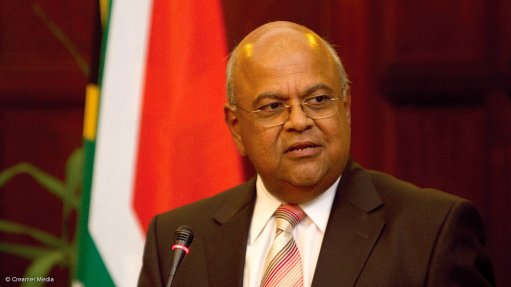
Finance Minister Pravin Gordhan
Photo by: Duane Daws
South Africa needs to re-engineer its economy and focus on its institutions and other strengths, Finance Minister Pravin Gordhan said at the Gauteng Economic Indaba, in Johannesburg, on Tuesday.
Reflecting on the state of South Africa’s economy, which contracted by 1.2% in the first quarter of this year, he noted that the country needed to reignite economic activity, but was not able to do it alone.
“We need to be able to provide the answers and [supply] the resources needed to get to 3% growth, let alone the 5% growth required by the National Development Plan (NDP),” he said.
He noted that it was also time to start focusing on what needed to be done at a microeconomic level to ensure the right [economic] ecosystem had been created as a result of government’s interventions.
He said South Africa had the most well developed capital markets on the continent, as well as strong institutions, a fact that had recently been reiterated by ratings agencies Moody’s and Standard & Poor’s.
Gordhan said government had “done the right kind of work with labour and business to earn another six months of breathing space” before the various ratings agencies again considered whether or not to downgrade South Africa to junk status.
Fitch on Wednesday affirmed South Africa’s investment-grade credit rating.
Meanwhile, he pointed out that 90% of South Africa’s borrowings this year, which amounted to R128-billion, would take place in rand, not euros or dollars, which was a major advantage the country had when compared with the rest of the continent.
“Because capital markets welcomed borrowings, oil- and resource-based economies remained in an economically good position [before the recession]. Therefore, [other African] countries borrowed in dollars and euros. The commodity cycle went down and their currencies started depreciating,” he said, adding that these countries now found themselves experiencing fiscal difficulties.
Gordhan pointed out that growth patterns for the next few years were depressing and that it was imperative that investment ideas were converted into real deals to increase the country’s scale of investment.
“Our gross domestic product spending on infrastructure has been good up until now and government is in the process of developing a new package to ensure that infrastructure projects do not whittle down,” he said.
He stressed that there was currently a good environment for business in the country and said South Africans were more pessimistic than they needed to be regarding the business environment.
“Foreigners see the value of being based in South Africa and they see lots of positives in investing in the country,” he asserted, noting that South Africa still had the best business infrastructure on the continent.
“Renewed efforts in terms of promoting growth and economic reforms, in terms of business and labour in the past few months, are also beginning to pay dividends,” he said.
Gordhan pointed out that youth unemployment had still not been dealt with properly, stating that government needed to demonstrate to its citizens that business and labour elites had the youth’s interests at heart.
“Global concerns are similar to the ones experienced in South Africa. One of the major issues that people are experiencing across the globe is that productivity gains are not being widely shared,” he said.
He added that people wanted business and enterprises to be productive, but the “cream” was being whisked away by the few at the top.
“Global wealth among the rich had grown 8% to $168-trillion,” he said.
Gordhan further stated that productivity in growth had slowed and inequality had risen on a global scale.
“Today, inequality is a concern that results in populist politics and social disruption and people are looking for an inclusive model of growth, which underpins the type of work being done in Gauteng,” he said.
The global environment was dismal, he said, pointing out that the general view was that the recession had not worked its way out of the system, particularly regarding European banks and the Chinese economy.
“The Indian economy is a bright spark and has grown by 7% in the last quarter,” he said.
He stated that, generally, there was too much financial volatility in the system and business confidence was low, which had resulted in a negative attitude towards emerging markets.
“[South Africa] is capable of holding our own destiny in our own hands and our plans work in concrete terms,” he said.